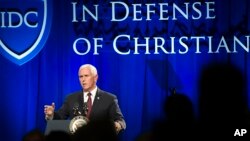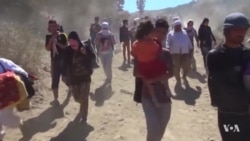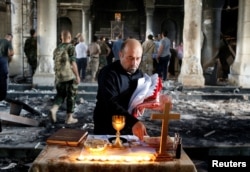U.S. Vice President Mike Pence says the State Department will no longer fund "ineffective" U.N. relief efforts for persecuted and religious minorities in the Middle East, and instead pay for them directly through the U.S. Agency for International Development.
At the State Department on Thursday, spokesperson Heather Nauert said while details of this new initiative are still being worked out, it is not a blanket cut of U.S. funding to all United Nations relief agencies.
WATCH: Trump Administration Shifts Persecuted Minority Aid Away From United Nations
"The U.N. still gets some of its money for this, but we will look for other avenues in which to more efficiently fund these types of religious minorities so that they can eventually return back home," Nauert said.
The U.S. will also not "shy away from funding religious-based, nongovernmental organizations," Nauert said, adding the U.S. will continue to support other religious minorities around the globe.
Christian dinner
Pence announced the move in a Wednesday night speech at a dinner for a group called In Defense of Christians, which works to "promote greater awareness of the plight of Christians in the Middle East."
"We will no longer rely on the United Nations alone to assist persecuted Christians and minorities in the wake of genocide and the atrocities of terrorist groups," Pence said. "The United States will work hand-in-hand from this day forward with faith-based groups and private organizations to help those who are persecuted for their faith."
The vice president said the U.N. has failed to help religious minorities, leaving them to "suffer and struggle needlessly."
Pence did not give specifics about which countries are involved, the timing of the change or how much money would be shifted from U.S. contributions to the United Nations.
He said Christianity is "under unprecedented assault in those ancient lands where it first grew," making specific references to Iraq, Syria, Egypt and Lebanon.
Congressman Chris Smith, a Republican from New Jersey, praised Pence's speech and said he agreed that Christians in the region are at risk.
"And the problem has been in the UNHCR and other U.N. agencies have bypassed many, but not all, but many of the Christians who are in desperate need of food, clothing shelter, medicines," Smith told VOA. "And, I actually chaired nine congressional hearings, went to Irbil, raised the issue with the people from the United Nations and said, you know you gotta stop this. You gotta—you know the Christians are not going to the UNHCR sponsored camps because the women are at risk and the men are beaten, some are even killed."
U.N. spokesman Farhan Haq said, "Humanitarian assistance in Iraq, as in other contexts, is provided in an impartial manner on the basis of greatest need. Humanitarians will continue to provide assistance in Iraq on this basis, in line with humanitarian principles."
Four relief agencies
According to the United Nations, its four main relief agencies are the U.N. Development Program (UNDP), the U.N. Refugee Agency (UNHCR), the U.N. Children’s Fund (UNICEF) and the World Food Program (WFP).
The latest data available from each of those four says the United States provides about $4.5 billion a year in total funding and is the top donor for all except the UNDP.
Without clarity from the Trump administration, it is impossible to know how those programs will be affected.
For example, the funding includes $311 million for UNDP. More than one-third of that money goes to Afghanistan, and about $13 million to programs in Iraq. Of the $311 million, $66 million is already funded directly through USAID.
John Eibner, CEO of the Zurich-based Christian Solidarity International, said much more than redirecting aid is needed to help Christians and other minorities under threat in Iraq and Syria.
"It is true that the U.N. is a big, bureaucratic organization, and there are lots of politics connected with how aid is distributed, but the same is also true of USAID," Eibner told VOA. "But the real issue facing Christians in the Middle East is not humanitarian aid, it’s security. It’s insecurity that has put them in the position where they now need humanitarian aid."
He also said U.S. policy has greatly contributed to the challenges Christians face in the Middle East.
"There have been waves of persecution against Christians and other religious minorities over the centuries, but there’s no question about the instability that has been created by failed regime-change policies that have not produced what was promised," Eibner said.
Other contributions reduced
Pence’s speech was not the first time the administration pushed to reduce U.S. contributions to the United Nations, which Trump says are more than the country’s fair share.
In June, the U.N. General Assembly voted to cut $600 million from the organization’s nearly $8 billion annual peacekeeping budget amid pressure from the United States.
The Trump administration also announced in April it would no longer fund the U.N. Population Fund.
Pence singled out the Islamic State group as the "embodiment of evil in our time," and said just as important as defeating the militants is "making sure that we provide aid and comfort to those who have suffered so much loss and grief and ensure that they can avail themselves of their right to return."
He said protecting religious freedom is a top priority of the Trump administration, while also announcing he will be visiting the Middle East in December.
"I promise you one of the messages that I will bring on the president’s behalf to leaders across the region is that now is the time to bring an end to the persecution of Christians and all religious minorities," Pence said.
VOA's Victor Beattie, Katherine Gypson on Capitol Hill, Margaret Besheer at the United Nations and Nike Ching at the State Department contributed to this report.







